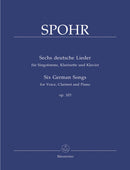| 作曲者 | Louis Spohr (1784-1859)・ルイ・シュポーア |
| タイトル | Six German Songs for voice, clarinet and Piano op. 103 |
| 出版社 | Bärenreiter・ベーレンライター |
| 楽器編成 | Voice, Clarinet and Piano |
| 楽器編成(詳細) | voices/clarinet/piano |
| 品番 | 9790006492138 |
| 校訂者 | Friedrich Otto Leinert |
| 形状 | 24/4 ページ・30.0 x 23.0 cm・135 g・Stapled |
| 出版年 | 2018年第21刷 |
| 出版番号 | BA 7571 |
| ISMN | 979-0006492138 |
Spohr composed the Sechs deutsche Lieder (Six German Songs), Op.103, in 1837. From about 1809, a few years after taking up the Post of Konzertmeister in Gotha, he constantly returned to the problem of the song with piano accompaniment (he composed roughly 90 songs in all). It is true that the form of the Lied was not Spohr's principal interest, master of the symphony, opera and chamber music as he was. But the same preference for unusual combinations, the delight in experiment, that is found in such instrumental pieces as the Septet, Octet, Nonet and the Symphony for Two Orchestras, is also discernible in the songs, and repeatedly gives rise to new ventures. Of all his songs with obbligato instruments, it is the present set with clarinet, Op.103, that have succeeded in reclaiming for themselves a place in the repertoire of today.
Sei still mein Herz (Carl B. v. Schweitzer): Ich wahrte die Hoffnung - Zwiegesang (Robert Reinick): Im Fliederbusch ein Vöglein saß - Sehnsucht (Emmanuel Geibel): Ich blick in mein Herz - Wiegenlied (Hoffmann von Fallersleben): Alles still in süßer Ruh - Das heimliche Lied (E. Koch): Es gibt geheime Schmerzen - Wach auf (Unbekannt): Was stehst du lange und sinnest nach?



